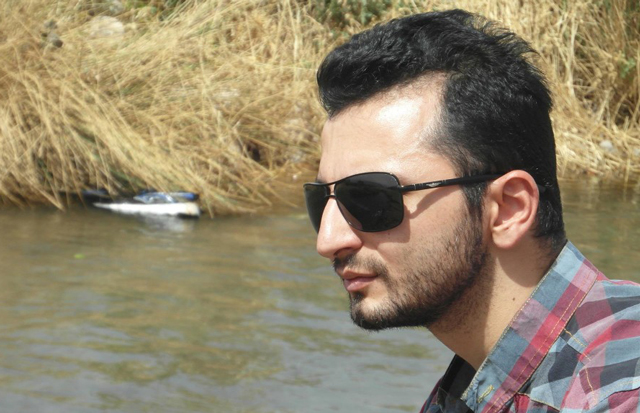Prisoner of Conscience on Hunger Strike Transferred to Clinic as His Condition Worsens
Fourteen days after prisoner of conscience Ali Shariati embarked on a hunger strike to protest the judicial process of his case, he remains on strike inside Evin Prison. His condition was defined as “very worrying” after he lost partial consciousness on the third day of his wet (refusing food and water) hunger strike, a source close to him told the International Campaign for Human Rights in Iran.
Shariati, who was a campaign worker during Hassan Rouhani’s presidential campaign, was transferred to Evin Prison’s clinic half-conscious and suffering from partial paralysis, the source said. Shariati began his hunger strike on November 3, 2015.
“They hooked him up to an IV, and he became a bit better but he said he will not stop his hunger strike until the authorities look into his demands,” added the source.
“His first demand is to be allowed to go free on bail until the final sentence is issued by the Appeals Court. Secondly he wants a professional review of his case because he believes he has received an unjust sentence based on irrational evidence,” the source told the Campaign.
Shariati, 29, was arrested for a third time on February 18, 2015, by Ministry of Intelligence agents at his home in connection with his postings on social media, including Telegram, that were critical of the government. He was held in solitary confinement for five months in Evin Prison before being moved to the facility’s public ward.
On September 11, 2015, Judge Salavati of Branch 15 of the Revolutionary Court sentenced Shariati to 12 years and 9 months in prison for “propaganda against the state,” “acting against national security,” “insulting the president,” and “having a satellite dish at home.” Salavati is often hand-picked by the Judiciary to preside over politically motivated cases because of the harsh sentences he hands down.
Authorities in Iran have cracked down particularly hard on any dissenting opinion expressed on social media, a platform they have come to fear due to its near ubiquitous use among Iranian youth, as hardliners seek to maintain a repressive grip over the domestic sphere.
“Ali is [a] prisoner of conscience of the Rouhani Administration, even though he supports his government. He was very active in Mr. Rouhani’s campaign office,” the source close to Shariati said.
Ali Shariati, who has a bachelor’s degree in architecture, was first arrested on February 14, 2010, and held for a month in solitary confinement at Evin Prison. He was released on bail until his trial, presided by Judge Pir-Abbasi of the Revolutionary Court, when he was sentenced to two years in prison and 74 lashes. The Appeals Court reduced the sentence to one year in prison, which Shariati completed, but the lashing sentence was never carried out.
The second arrest took place on June 13, 2014. Shariati was held for a week and then released but he was frequently summoned to the Intelligence Ministry for questioning until his last arrest on February 18, 2015.
In a joint letter with fellow prisoner of conscience Majid Azarpey, who is also on hunger strike, Ali Shariati addressed President Rouhani and said: “You are the enforcer of the Constitution. We want you to end your inaction and take a stand against these witch hunts. Do not let these extremist forces help the enemies of our land with their injustices.”







